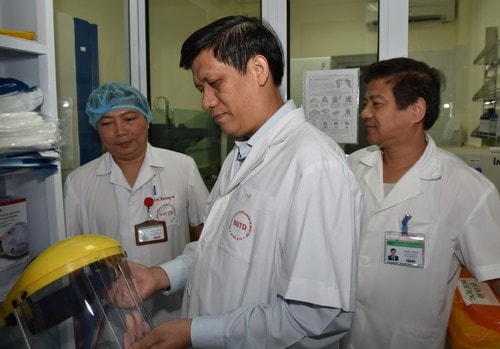Four national rapid response teams established to prevent Ebola
To strengthen measures to prevent Ebola, the health sector will establish four national rapid response teams corresponding to the four regions of the North, Central, South and Central Highlands.
On the morning of October 19, Professor Nguyen Thanh Long, Deputy Minister of Health, inspected the work of preventing and fighting Ebola epidemic at the Central Hospital for Tropical Diseases (Hanoi).
Reporting to Deputy Minister Long, the hospital leader said that he had established an external emergency team; regularly trained staff; and had a mobile negative pressure isolation chamber to provide maximum protection for patient treatment.
The hospital has also provided standard personal protective equipment for staff and is preparing to receive 1,000 standard suits according to the World Health Organization (WHO) guidelines to prevent cross-infection. In particular, this place has built a level 2 biosafety laboratory, which will be assessed by the Ministry of Health and WHO for Ebola virus testing conditions next week.
 |
| Deputy Minister of Health Nguyen Thanh Long inspected epidemic prevention work at the Central Hospital for Tropical Diseases. Photo: NP |
Deputy Minister Long requested all medical facilities to raise their vigilance and response level to the Ebola epidemic. In addition to the rapid response teams of each province and district, the health sector will establish four rapid response teams at the national level corresponding to the four regions of the North, Central, South and Central Highlands to strengthen epidemic prevention.
According to Professor Long, hospitals must prepare isolation areas to receive, isolate and support treatment for suspected patients, especially preparing personal protective equipment; at the same time, review the entire process of handling medical waste from patients, specimens, cleaning hospital rooms; train medical staff, even administrative staff, security guards, cleaners, etc.
The Department of Medical Examination and Treatment is responsible for directing hospitals to review their plans for preventing and combating the Ebola virus and continue to provide training to update knowledge and experience from around the world to strengthen medical staff. Next week, the Department will organize a large-scale exercise at the Central Hospital for Tropical Diseases and assigned hospitals in the Central and Southern regions.
Representatives of WHO and international organizations said that the latest research shows that the Ebola virus has not yet changed its genes and virulence, and there is no clear evidence of a change in the transmission route. The Ebola virus is still transmitted through direct contact with secretions, but it should be noted that if the patient vomits, coughs, or sneezes with secretions containing high concentrations of the virus, and the person in contact has scratches on the skin or damaged mucous membranes, the virus can also penetrate.
Currently, Senegal and Nigeria have not detected any new infections. As of October 18, the world recorded nearly 9,300 cases, of which 4,604 people died. Notably, there were 431 cases of medical staff, 247 deaths.
The Ebola epidemic has been complicated in recent days, however, the fact that three nurses from Spain and the US were infected with the virus while caring for patients is a public health incident. This forces all countries to review, check and review their infection prevention and control measures to learn from their experiences.
According to Vnexpress






